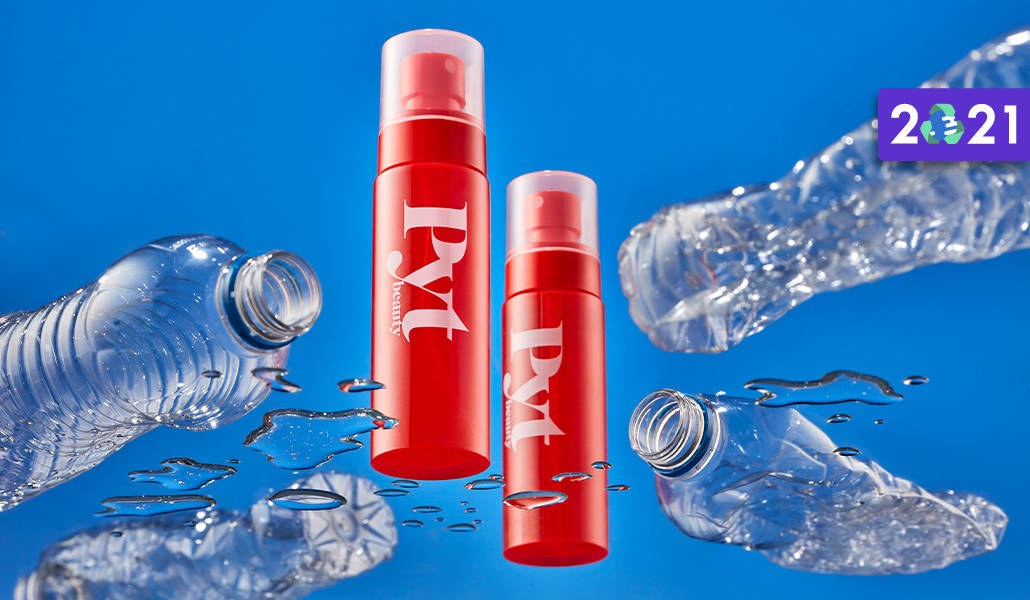Today’s story is part of Glossy’s Earth Week series, which spotlights sustainability efforts and topics across the beauty and fashion industries. You can read our other coverage here.
For a new school of beauty brands, sustainability isn’t an afterthought, but instead part of their main draw — though they’re cautious of how to even use the word.
Like ‘clean beauty,’ there are no strict guidelines around brands labeling themselves as sustainable. “The term sustainability is becoming a little bit problematic, because it literally has no definition,” said Dominika Minarovic, co-founder of Bybi Beauty, a colorful ‘clean’ skin-care brand sold at Target and Credo Beauty.
Of course, by introducing products that didn’t previously exist, a beauty brand is inherently not sustainable. “Our environmental mission is to be conscious of the environment,” Minarovic said. “We’re not claiming to be sustainable, because actually, we are a product brand. We distribute products globally, we manufacture products and we make consumer goods that go to landfills. So to really claim that we’re sustainable is a little bit tricky in itself.”
Bybi is one within a group of sustainability-focused brands that have debuted at Target this year. They also include Gen-Z-focused, affordable makeup brand PYT; Hey Humans, a collection of personal care products co-created with Jada Pinkett Smith and her family; and Anomaly, a hair-care range co-created with Priyanka Chopra Jonas. This placement makes the products accessible to consumers both new to and already familiar with environmentally-conscious beauty. “It is no secret that Target has made environmental sustainability a key pillar of their corporate ethos,” said Scott Kestenbaum, svp at Maesa, the incubator behind new sustainable brands Hey Humans and Anomaly, both launched in February. “Target has been an incredible partner and we’re so thankful for their support of brands that put the environment above all else.” Target recently showcased Hey Humans, Anomaly and other environmentally progressive brands on an Earth Day end cap in its stores, he said.
For PYT’s launch at Target, the brand actually reduced its prices, bringing the most expensive product, its eyeshadow palette, from $32 to $28. Hey Humans products, which include personal care items like body wash, toothpaste and deodorant, range in price from $3.99-$5.99, while Bybi’s skin-care products span $9.99-$25.99.

Manufacturing will never itself be sustainable, but what these brands can do is increase their efforts to educate customers about what to do with their products when they’ve used them up. No longer does it suffice to have detailed ingredient information on a product page or label. PYT and Bybi’s product pages also include detailed instructions as to how to best recycle products.
In addition to being sold at Target, PYT Beauty can also be found at Ulta, Macy’s, and Credo Beauty. On its own e-commerce site, it uses clear iconography to signify which products have been made with recycled plastic. In addition, for each product, there’s information on “How I’m Sustainable,” including its resin codes (which identify the type of plastic used) and material makeup, plus there’s detailed instructions on how to recycle it. Though PYT has eliminated outer packaging for many of its products, the boxes that some come in, as well as products’ labels, provide information on how to recycle them.
Bybi, which was a blog before it was a brand, uses content to spread its ‘climate-conscious’ message (a term it uses in place of ‘sustainable’). “[Content] is the backbone of our brand,” said Minarovic. “We see the value in producing really high-quality content for our audiences and disseminating that across any channels that we can. We have our own podcast, and we’ve also interviewed a number of activists.”
On a longer-term basis, Bybi is on a mission to become a carbon-negative brand. “All of our micro sustainability goals ultimately funnel through to the end goal that we have to be carbon negative,” Minarovic said. “The world is a better place with Bybi on the shelves, because the more products we replace in retailers like Target, [the more] we’re helping turn off those carbon taps and actually create a supply chain in an ecosystem that absorbs more carbon than it releases.”
As a result, more customers may come to show interest in brands prioritizing sustainability. “The best way to increase the amount of plastic that actually does get recycled is to create demand for recycled resin,” said Kestenbaum. “The more demand that exists for PCR packaging, the more financially incentivized the recycling industry will be to invest in recycling infrastructure.”
Though products will always be the top priority in a retail setting and in a customer’s mind, social media allows for brands to have a platform to also serve as educators. Education is key, especially as, historically, sustainably-minded products have not been available at mass prices. Lower prices, of course, also open these brands up to Gen-Z consumers, who are outspoken about wanting sustainably-minded products. “You have to take on that educator role if you’re going to be a thought leader in this space,” Minarovic said. Bybi hosts an event series called the “Susty Summits,” where external experts brought in are the focus, rather than the brand. (The events were formerly held in London, where the brand is based, though they now play out monthly on Instagram Live.)
For Maesa, its brand co-founders’ followings help get the message out. “Fortunately, our brands are founded and co-owned by individuals [like Pinkett Smith and Chopra Jonas] who are both incredibly passionate about protecting the environment and have a big megaphone,” said Kestenbaum.

“Anomaly has pushed the limits of what is achievable, in terms of minimizing environmental footprint,” Kestenbaum said. Its bottles were specifically engineered to have the thinnest wall possible. “By utilizing a super-thin wall design and reducing the gram weight of the bottle, we actually lowered our packaging cost, allowing us to invest more in high-quality formula ingredients,” he said. “Anomaly’s custom thin wall bottles are molded in 100% post-consumer recycled material. Being able to do this and maintain a $6 retail price was incredibly challenging.”




